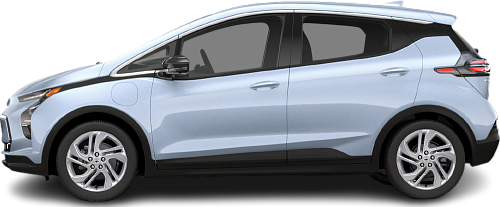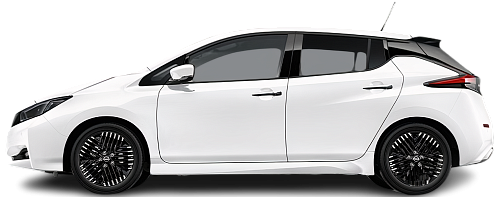USA EV Comparison: Chevrolet Bolt EV Gen 3 vs Nissan Leaf 60 kWh
Struggling to Decide? Let AI Help!
Your AI Summary Is Ready!
General Info
Since both vehicles have been discontinued, they are now only available on the used car market. You can get the Chevrolet Bolt EV Gen 3 (2022-2023) for as low as $9640, while the Nissan Leaf 60 kWh (2022-2025) begins at $11467.
The two vehicles share the same body style: Hatchback.
| Property | Chevrolet Bolt EV Gen 3 | Nissan Leaf 60 kWh |
|---|---|---|
| Years of Production | 2022-2023 | 2022-2025 |
| Current Status | Discontinued | Discontinued |
| Country of Manufacture | USA | Japan, UK, USA |
| Body Style | Hatchback | Hatchback |
| Market Availability | USA | EU, USA |
| Price USA (Used) | $9640 | $11467 |
| GCC Score | 5.6 | 5 |
Range and Efficiency
The Chevrolet Bolt EV Gen 3 (2022-2023) boasts a greater real-world range, a larger battery, and superior energy efficiency compared to the Nissan Leaf 60 kWh (2022-2025).
| Property | Chevrolet Bolt EV Gen 3 | Nissan Leaf 60 kWh |
|---|---|---|
| Range (EPA) | 259 mi | 212 mi |
| Range (WLTP) | - Range (WLTP) | 247 mi |
| Range (GCC) | 246 mi | 209 mi |
| Battery Capacity (Nominal) | 65 kWh | 60 kWh |
| Battery Capacity (Usable) | 61.8 kWh | 59 kWh |
| Efficiency per 100 mi | 25.1 kWh/100 mi | 28.2 kWh/100 mi |
| Efficiency per kWh | 3.98 mi/kWh | 3.54 mi/kWh |
| Range and Efficiency Score | 7.5 | 6.1 |
Charging
Both vehicles utilize a standard 400-volt architecture.
The Nissan Leaf 60 kWh (2022-2025) offers faster charging speeds at DC stations, reaching up to 100 kW, while the Chevrolet Bolt EV Gen 3 (2022-2023) maxes out at 55 kW.
The Chevrolet Bolt EV Gen 3 (2022-2023) features a more powerful on-board charger, supporting a maximum AC charging power of 11.5 kW, whereas the Nissan Leaf 60 kWh (2022-2025) is limited to 6.6 kW.
| Property | Chevrolet Bolt EV Gen 3 | Nissan Leaf 60 kWh |
|---|---|---|
| Max Charging Power (AC) | 11.5 kW | 6.6 kW |
| Max Charging Power (DC) | 55 kW | 100 kW |
| Architecture | 400 V | 400 V |
| Charge Port | CCS Type 1 | CHAdeMO |
| Charging Score | 6 | 3.8 |
Performance
Both vehicles are front-wheel drive.
Although the Nissan Leaf 60 kWh (2022-2025) has more power, the Chevrolet Bolt EV Gen 3 (2022-2023) achieves a faster 0-60 mph time.
| Property | Chevrolet Bolt EV Gen 3 | Nissan Leaf 60 kWh |
|---|---|---|
| Drive Type | FWD | FWD |
| Motor Type | PMSM | PMSM |
| Motor Power (kW) | 150 kW | 160 kW |
| Motor Power (hp) | 201 hp | 215 hp |
| Motor Torque | 266 lb-ft | 251 lb-ft |
| 0-60 mph | 6.5 s | 6.8 s |
| Top Speed | 91 mph | 106 mph |
| Performance Score | 3.6 | 3.6 |
Dimensions
The Nissan Leaf 60 kWh (2022-2025) has a longer body, while the Chevrolet Bolt EV Gen 3 (2022-2023) stands taller, offering a more elevated ride. Their widths are almost identical, so both offer a similar amount of shoulder room.
The Nissan Leaf 60 kWh (2022-2025) boasts a more extended wheelbase.
| Property | Chevrolet Bolt EV Gen 3 | Nissan Leaf 60 kWh |
|---|---|---|
| Length | 163.2 in | 176.4 in |
| Width (with Mirrors) | 80.3 in | 79.9 in |
| Width (w/o Mirrors) | 69.5 in | 70.5 in |
| Height | 63.4 in | 61.7 in |
| Wheelbase | 102.4 in | 106.3 in |
Cargo and Towing
The Nissan Leaf 60 kWh (2022-2025) features a larger trunk, but the Chevrolet Bolt EV Gen 3 (2022-2023) offers greater maximum cargo capacity when the rear seats are folded.
Neither car is equipped with a frunk (front trunk).
Neither vehicle is officially rated for towing in the US.
| Property | Chevrolet Bolt EV Gen 3 | Nissan Leaf 60 kWh |
|---|---|---|
| Number of Seats | 5 | 5 |
| Curb Weight | 3589 lb | 3901 lb |
| Cargo Volume (Trunk) | 16.6 ft3 | 23.6 ft3 |
| Cargo Volume (Max) | 57 ft3 | 30 ft3 |
| Cargo Volume (Frunk) | - Cargo Volume (Frunk) | - Cargo Volume (Frunk) |
| Towing Capacity | - Towing Capacity | - Towing Capacity |
| Cargo and Towing Score | 4.8 | 4.6 |




